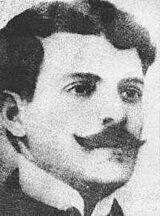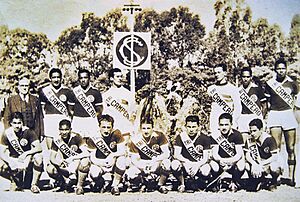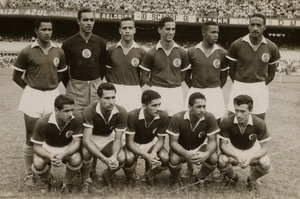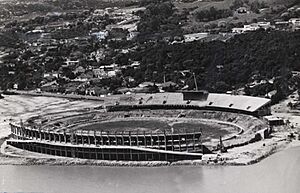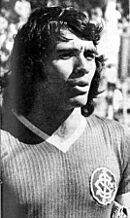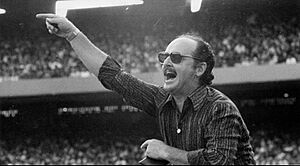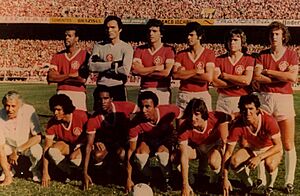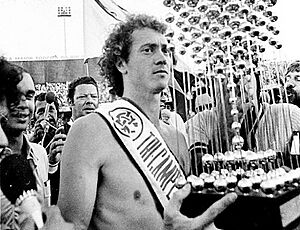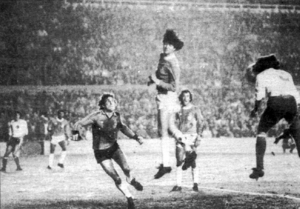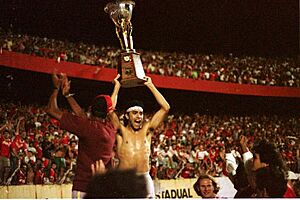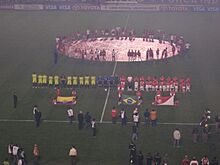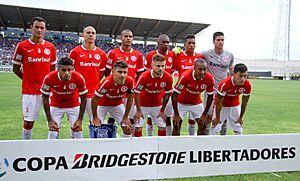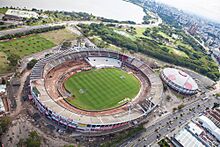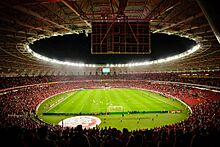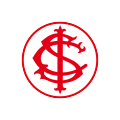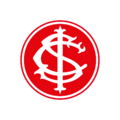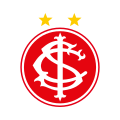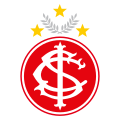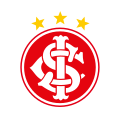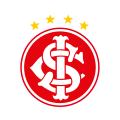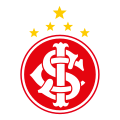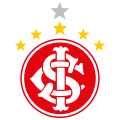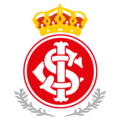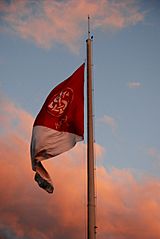SC Internacional facts for kids
 |
||||
| Full name | Sport Club Internacional | |||
|---|---|---|---|---|
| Nickname(s) | Colorado (The Reds) Clube do Povo (The People's Club) Celeiro de Ases (Factory of Aces) Rolo Compressor (The Steamroller) |
|||
| Short name | Inter | |||
| Founded | 4 April 1909 | |||
| Stadium | Beira-Rio | |||
| Capacity | 50,128 | |||
| President | Alessandro Barcellos | |||
| Head coach | Roger Machado | |||
| League | Campeonato Brasileiro Série A Campeonato Gaúcho |
|||
| 2024 2024 |
Série A, 5th of 20 Gauchão, 1st of 12 |
|||
|
||||
Sport Club Internacional, often called Internacional or simply Inter, is a famous Brazilian football club. It is based in Porto Alegre, a city in Brazil. The team plays in the top Brazilian league, Série A, and also in the top state league, Campeonato Gaúcho Série A.
Inter's home stadium is called Estádio Beira-Rio, which means "Riverside". This stadium was one of the places where games were played during the 2014 FIFA World Cup. It can hold over 50,000 fans.
The club was started in 1909 by the Poppe brothers. They wanted to create a club that was open to everyone, without any unfair rules. Inter's colors are red and white, and their fans are known as Colorados (The Reds).
Internacional is one of the most successful clubs in Brazil and the Americas. They have won many international titles, including the Copa Libertadores and the FIFA Club World Cup in 2006. In the Club World Cup, they famously beat Barcelona. They won the Copa Libertadores again in 2010.
Inter also won the Brazilian league three times: in 1975, 1976, and 1979. The 1979 win was special because they were undefeated! Their biggest rival is Grêmio Foot-Ball Porto Alegrense, and their matches are called Grenal, one of the world's most exciting derbies.
Contents
- Club History
- How Inter Started (1910s)
- Growing Stronger (1920s-1930s)
- The "Steamroller" Era (1940s)
- The "Little Steamroller" (1950s)
- Building the Beira-Rio Stadium (1960s)
- Kings of Brazil (1970s)
- Challenges and Close Calls (1980s)
- Years of Toughness (1990s)
- New Beginnings and Global Wins (2000-2015)
- Relegation and Comeback (2016-Present)
- Club Symbols
- First Team Players
- Club Honours
- See also
Club History
How Inter Started (1910s)
Sport Club Internacional was founded by three brothers: Henrique, José, and Luiz Poppe. They moved to Porto Alegre around 1908. The younger brothers loved football and wanted to play. So, Henrique helped them create a new club.
Unlike other teams in Porto Alegre at the time, which were mostly for people of German descent, Inter welcomed everyone. They wanted a club for both Brazilians and foreigners. This was a big deal because other clubs had unfair rules.
The club's colors, red and white, were inspired by the city's street carnival. After a vote, red was chosen. Inter's first playing field was in a humble neighborhood called Ilhota. Later, they moved to Campo da Várzea, which is now Parque da Redenção.
In 1912, Inter moved to Chácara dos Eucaliptos. This was their first stadium just for them. Here, they started winning, taking home the City Championship in 1913 and 1917.
Growing Stronger (1920s-1930s)
The 1920s were a challenging time for Inter. They didn't win many titles and faced money problems. The club almost closed down! But Inter fought back and became stronger.
They won their first state title in 1927. They also started building their first real home stadium, Estádio dos Eucaliptos. Inter became even more popular by welcoming all athletes, including black players from other leagues.
The Eucaliptos Stadium opened in 1931. It became the place where Inter won many glories. Inter became known as the "Clube do Povo" (People's Club). They connected with ordinary people in society. Great players like Sylvio Pirillo and Tupan, who came from the "Black Shins" league, played for Inter. This was the start of the famous "Rolo Compressor" team.
The "Steamroller" Era (1940s)
The 1940s were a golden age for Internacional. They had amazing players and often beat their rival, Grêmio. The Eucaliptos stadium was always full of cheering fans.
The team was called the "Rolo Compressor" (Steamroller). This name was given because they "crushed" their opponents. From 1939 to 1948, they won eight Rio Grande do Sul championships. They even won the state championship six times in a row!
Inter's success was partly because they allowed black players to join their team starting in 1928. Other rival clubs like Grêmio didn't allow this until much later. This decision made Inter's team much stronger.
Famous players from this era included Alfeu, Tesourinha, Abigail, Carlitos, and Adãozinho. The "Steamroller" showed how powerful Inter was at that time.
The "Little Steamroller" (1950s)
Inter fans helped build the concrete stands of Eucaliptos Stadium from 1947 to 1950. Just like later with the Beira-Rio stadium, fans brought materials to help improve the club's facilities. After these upgrades, the stadium hosted two matches during the 1950 FIFA World Cup.
On the field, Inter continued to do well. The 1950s team had great players like Paulinho, Florindo, and Chinesinho. They were led by manager Teté. This team was called the "Rolinho" (Little Steamroller), a nod to the great team of the 1940s.
The biggest stars of this time were strikers Bodinho and Larry. Inter won five state titles in this decade. They also had a historic 6-2 victory against Grêmio when Grêmio's new stadium, Estádio Olímpico, opened. Many Inter players from this period also played for the Brazilian national team that won the 1956 Pan-American Games.
Building the Beira-Rio Stadium (1960s)
Inter played at the Eucaliptos Stadium for 30 years. But as the club grew, the stadium became too small for their many fans. So, in 1956, the idea for a new stadium, the Beira-Rio, began.
The Beira-Rio was built with a lot of help from the fans. They brought bricks, cement, and iron for the construction. There were even radio shows to encourage fans across Rio Grande do Sul to help. The 1960s were tough for Inter on the field, and it seemed like the Beira-Rio would never be finished. Fans would go to watch the construction workers and cheer them on.
Even with limited money, Inter put together good teams with young talents. In their first national competition, the Torneio Roberto Gomes Pedrosa in 1967, Inter did very well, finishing second. The next year, they were runners-up again. Inter was becoming one of Brazil's top clubs.
The Beira-Rio stadium finally opened on April 6, 1969. This was two days after Inter's 60th birthday. The first game was a 2-1 win against Benfica from Portugal. Claudiomiro scored the first goal in the new stadium.
Kings of Brazil (1970s)
In the 1970s, Internacional won eight Campeonato Gaúcho titles in a row! This was the longest winning streak in the state. But even bigger achievements were coming.
The 1970s are remembered as a golden time for Inter fans. The new Beira-Rio Stadium was perfect for their passionate supporters. Inter did well in national championships, finishing fifth several times. Players like Valdomiro, Claudiomiro, and Carpegiani became key figures.
In 1972, Chilean defender Elias Figueroa joined Inter and quickly became a fan favorite. Inter finished third in the Brazilian league that year.
In 1974, Rubens Minelli became the coach. He was known for his smart tactics. Inter also signed goalkeeper Manga and left winger Lula. With Valdomiro on the right and Lula on the left, Inter had strong wings. In midfield, Falcão and Paulo César Carpegiani were stars. Young players from the youth team also joined the main squad. The team was ready to win.
In 1975, Inter went on a tour of Europe and played amazingly well. They won 13 out of 14 games, scoring 50 goals and only letting in one! People even compared them to the famous AFC Ajax team.
After winning their seventh state title in a row, Inter started the 1975 Brazilian Championship. They played very well, winning most of their games. In the semifinal, they faced Fluminense, a very strong team. Inter won 2-0 with goals from Lula and Carpegiani. This sent them to the final against Cruzeiro.
The final was a huge event in Porto Alegre. Tickets sold out quickly, and fans came from everywhere. The winning goal was scored by Elias Figueroa. It was called the "illuminated goal" because he headed the ball into the net in a beam of sunlight. Inter won 1-0, becoming the first club from Rio Grande do Sul to win the Brazilian Championship! They had a fantastic record of 18 wins, 8 draws, and only 3 losses.
For the 1976 championship, Inter had an even stronger team. They dominated the league, winning 19 out of 23 matches. In the semifinal, they had a tough match against Atlético Mineiro. Falcão scored a legendary goal to send Inter to the final.
Internacional won their second Brazilian title easily against Corinthians, with goals from Dario and Valdomiro. This made Inter champions of Brazil for the second time in a row! Coach Rubens Minelli left after this success.
Inter played in the Copa Libertadores in 1976 and 1977 but didn't win the continental title.
The decade ended with another big title in 1979, under new coach Ênio Andrade. The 1979 Inter team was special. They could change their playing style easily. Mário Sérgio was a key player.
Inter reached the semifinals and beat Palmeiras. In the final, they faced Vasco da Gama. Inter won the first game 2-0 in Rio de Janeiro. For the second game at Beira-Rio, fans packed the stadium. Inter had not lost a single game in the championship so far. They wanted to win the title without any defeats.
The team, with players like Falcão, Batista, and Valdomiro, won the second game 2-1. Bira scored first, and Falcão scored the final goal. Internacional won their third Brazilian championship on December 23, 1979, and they did it undefeated! No other club in Brazil has done this since.
Challenges and Close Calls (1980s)
The 1980s started well for Inter. They reached the final of the Copa Libertadores for the first time in 1980. They played against Nacional from Uruguay. The first game at Beira-Rio was a 0-0 draw. In the second game in Montevideo, Inter lost 1-0.
Even though they lost that important match, Inter won the Campeonato Gaúcho four years in a row starting in 1981. However, their rival Grêmio won the Brazilian Championship in 1981 and the Libertadores and Intercontinental Cup in 1983. This made the 1980s a mixed decade for Inter. They had talented teams but often fell short in the biggest competitions.
Inter did win many international friendly tournaments during this time. They won the Joan Gamper Trophy in 1982, beating Barcelona and Manchester City. They were the only non-European team to win it.
In the late 1980s, Inter almost won the Brazilian Championship again, reaching two finals in a row. In 1987, they lost to a strong Flamengo team.
In 1988, Inter reached another final after a famous semifinal match against Grêmio. This game was called "The Grenal of the Century" because it was the first time these rivals met in a national knockout stage. Inter was losing 1-0 at halftime and had a player sent off. But with the fans cheering them on, Inter came back to win 2-1 with two goals from striker Nílson.
A few days later, Inter lost the final to Bahia. This showed that even in great moments, the 1980s were bittersweet for Inter.
In the 1989 Copa Libertadores, Inter came close to the title again. They reached the semifinals and faced Olimpia from Paraguay. Olimpia won the first game 1-0. In the second game at Beira-Rio, with nearly 70,000 fans, Olimpia won 3-2. The game went to a penalty shootout, and Olimpia won, knocking Inter out. This loss was a very sad moment for Inter fans.
Despite the lack of major titles, the 1980s saw the rise of future stars like midfielder Dunga and goalkeeper Taffarel. Both became world champions in 1994 with the Brazilian national team. In 1984, Inter's entire squad was called up for the Brazilian national team at the 1984 Summer Olympics, winning a silver medal.
Years of Toughness (1990s)
The 1990s started with hope. In 1992, Internacional won its fourth national title, the Copa do Brasil. It was an exciting journey. They beat Corinthians 4-0, then won a penalty shootout against Grêmio. In the semifinal, they beat Palmeiras twice. The final against Fluminense was dramatic. Inter won 2-1 at home with a penalty goal in the 88th minute, securing the title on away goals.
However, the rest of the 1990s were tough for Inter. Their rivals Grêmio were playing very well. But Inter fans stayed strong and united. They won four state championships (1991, 1992, 1994, and 1997). A memorable 5-2 win against Grêmio at their stadium helped lift the spirits of the fans during these difficult years.
In 1999, Inter almost got relegated to the second division. The season started with the return of Dunga, a former world champion and Inter captain. But the team struggled. On November 10, in a packed Beira-Rio, Dunga scored a header in the 81st minute to beat Palmeiras 1-0. This win saved Inter from relegation. The stadium lights even went out for a few minutes during the game!
New Beginnings and Global Wins (2000-2015)
After the tough 1990s, Inter faced more challenges in the early 2000s. In 2002, they almost got relegated again. They needed other teams to lose and had to beat Paysandu in a difficult away game. Inter won 2-0, saving themselves. Sadly, one of the goal scorers, Mahicon Librelato, died in a car accident just eleven days later.
But things started to change under a new president, Fernando Carvalho. He helped transform the club. They signed long-term contracts with young players and invested a lot in their youth academy. The number of club members grew from 7,000 to 45,000!
Under this new leadership, Inter's youth teams thrived. The club won four state titles in a row from 2002 to 2005. They were getting ready for a new era of football.
In 2006, Inter won the Copa Libertadores for the first time! They beat two strong teams, Nacional and São Paulo (who were the defending champions). In the final against São Paulo, Rafael Sóbis scored two goals in the first game, giving Inter a big advantage. In the second game at Beira-Rio, Inter drew, becoming South American champions! Striker Fernandão was a top scorer and gave his prize car to charity.
Internacional then went to the 2006 FIFA Club World Cup. They surprised everyone by beating the strong European champions Barcelona 1-0 in the final! This was their first ever World Championship. They also won the 2007 Recopa Sudamericana in 2007, beating Pachuca 5-2 on aggregate.
After these big wins, Inter struggled a bit in 2007. But in 2008, they won their state championship and the 2008 Copa Sudamericana, becoming the first Brazilian team to win this trophy. They beat Estudiantes from Argentina. In 2009, they were runners-up in the Brazilian Championship.
In 2010, Internacional won the Copa Libertadores again! They finished first in their group. In the quarterfinals, they beat Estudiantes. In the semifinals, they faced São Paulo again, winning a close match. In the final, Inter defeated Guadalajara 5-3 over two games, winning their second Copa Libertadores title.
This win meant they went to the 2010 FIFA Club World Cup again. Fans hoped they would win it twice. But they were surprisingly beaten 2-0 by TP Mazembe from Congo in the semifinal.
The Beira-Rio stadium underwent a big renovation from 2012 to 2014 to host matches for the 2014 FIFA World Cup. The project was called 'Giant Forever'. During this time, Inter played in other stadiums. The renovated stadium reopened in April 2014. It hosted five World Cup matches, with stars like Messi and Toni Kroos playing there.
The Beira-Rio is now the second-largest stadium in Rio Grande do Sul. It can hold over 50,000 people. It has hosted the final matches for many of Inter's most important titles.
Relegation and Comeback (2016-Present)
After a good start in the 2016 Campeonato Brasileiro Série A, Internacional began to struggle in 2016. They had a 14-game winless streak, the longest in their history. Two coaches were fired. Fernando Carvalho, who led the club during its successful 2000s, returned to help.
But it didn't work. The team continued to struggle. On December 11, 2016, Inter drew with Fluminense. This result meant they were relegated to the second division for the first time in their history. This was a very sad moment for the club, happening just ten years after winning the FIFA Club World Cup.
However, Inter quickly bounced back. They were promoted back to the top league in 2017 after finishing second in the second division.
Club Symbols
Crests
The first crest of Sport Club Internacional had the letters "SCI" in red on a white background. Later, the colors were swapped, with white letters on a red background.
- After winning national titles in 1975 and 1976, stars were added to the crest.
- A third star and a silver laurel were added after the undefeated national title in 1979.
- A fourth star was added after winning the Copa do Brasil in 1992.
- When the club won the Copa Libertadores in 2006, a bigger star was added.
- After winning the FIFA Club World Cup that same year, a special diamond star was placed above all others to celebrate the world title.
- In 2007, a crown was added to show their three international titles in a row.
- For the club's 100th birthday in 2009, a new crest was created. It has a circle around the traditional crest with the club's name and founding year, and the stars, crown, and laurels were removed. This is the current crest.
-
Crest celebrating the Copa do Brasil title in 1992.
-
Crest celebrating the 2006 Libertadores title.
-
Crest celebrating the 2006 FIFA Club World Cup title.
Flag
The flag of Sport Club Internacional has two triangles in red and white. The red triangle is at the flagpole side. In the top corner, near the flagpole, you can see the club's crest and the year it was founded. At the Beira-Rio stadium, there is a huge flag, 110 square meters, on a 55-meter-tall pole.
Saci (Mascot)
In the 1950s, newspapers used a cartoon of a little black boy in an Inter jersey to represent the club's popular fanbase. This character later became a Saci. A Saci is a playful creature from Brazilian folklore. He is known for playing pranks. Internacional adopted the Saci as its mascot because of these traits, showing how the club "plays pranks on its opponents" on the field.
Anthem
Nélson Silva, a composer from Rio de Janeiro, became an Internacional fan after visiting Porto Alegre in the 1940s. In 1956, after Inter lost a game, he was upset. He sat down and started writing a song praising Inter. This song became "Celeiro de Ases" (Barn of Aces).
The song became very popular among fans. In 1966, the club held a contest for an official anthem, but no other song captured the spirit of Inter fans like Nélson Silva's. So, his composition became the club's formal anthem. Nélson Silva never charged the club for using his song. He said his greatest achievement was being known as the man who wrote the Colorado anthem.
First Team Players
Here are some of the players currently on the Sport Club Internacional first team:
- Sergio Rochet (Goalkeeper)
- Vitão (Defender)
- Fernando (Midfielder)
- Enner Valencia (Forward)
- Rafael Santos Borré (Forward)
- Gabriel Mercado (Defender, Vice-captain)
- Andrés D'Alessandro (Sporting Director, former player)
Club Honours
Worldwide Titles
- FIFA Club World Cup: 2006
Continental Titles
- Copa Libertadores: 2006, 2010
- Copa Sudamericana: 2008
- Recopa Sudamericana: 2007, 2011
National Titles
- Campeonato Brasileiro Série A (Brazilian League): 1975, 1976, 1979
- Copa do Brasil: 1992
State Titles
- Campeonato Gaúcho (Rio Grande do Sul State League): 46 times, including 1927, 1940-1945 (six in a row!), 1969-1976 (eight in a row!), 2002-2005 (four in a row!), and 2008, 2009, 2011-2016.
|
See also
 In Spanish: Sport Club Internacional para niños
In Spanish: Sport Club Internacional para niños


